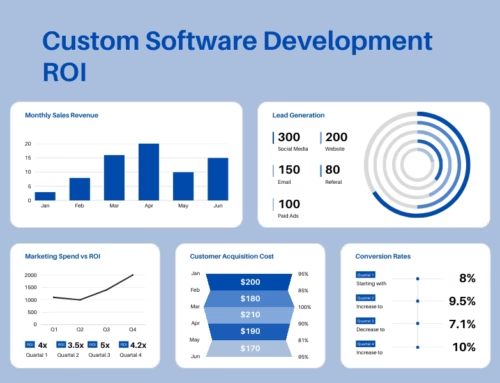Custom Web Apps Development: A Complete Guide to Building Scalable Business Solutions in 2025
Introduction
Businesses can no longer rely solely on off-the-shelf software to meet their specific needs in today’s fast-paced digital economy. That’s where making a custom web app comes in. Custom-built apps empower businesses to generate new ideas, drive growth, and stay ahead of the competition by streamlining their internal processes and delivering personalized experiences to customers. But what exactly makes custom web apps so helpful, and why should your business choose them over more traditional options? This guide will show you the best ways to build custom web apps that help your business grow, as well as the most essential benefits and strategies.
What is Custom Web Apps Development?
Defining Custom Web Applications vs. Off-the-Shelf Software
A custom web application is a software solution specifically designed and developed for your business’s unique needs. Unlike off-the-shelf software, which is built for mass use, custom apps focus on solving your specific problems and delivering a tailored experience.
Off-the-shelf tools may be quicker to deploy, but they often come with limitations, unnecessary features, and integration challenges. Custom web apps, on the other hand, give businesses complete control over functionality, user experience, and scalability.
Why Customization Matters for Businesses Today
The digital landscape is more competitive than ever. Customers expect seamless experiences, while businesses need technology that adapts to their evolving workflows. Custom web apps allow organizations to innovate, automate, and optimize processes in ways that generic solutions simply cannot.
For example, while a retail business might use an E-commerce Development solution to manage transactions, a custom-built web app can add features like real-time inventory tracking, personalized recommendations, or even integration with logistics partners.
Key Benefits of Custom Web Apps for Businesses
Improved Scalability and Flexibility
One of the most significant advantages of custom web apps is scalability. As your business grows, your application can evolve with you—adding new modules, supporting more users, or handling higher traffic without performance issues.
Enhanced Security and Data Protection
Data breaches are costly and damaging to reputation. Off-the-shelf solutions are more vulnerable because they are widely used. Custom web apps, however, are built with custom security protocols designed to protect sensitive data according to your industry’s compliance requirements.
Better Integration with Existing Systems
Businesses today use multiple platforms—CRM, ERP, payment gateways, marketing tools, etc. With Custom API Development, web apps can integrate seamlessly with your existing ecosystem, creating a unified workflow and eliminating inefficiencies.
The Custom Web Apps Development Process
Requirement Gathering and Planning
Every successful project begins with understanding your business needs. This stage includes stakeholder interviews, defining project goals, and creating a clear roadmap.
Design, Prototyping, and User Experience
User experience is a critical factor in adoption. During this phase, designers create wireframes, prototypes, and UI/UX layouts to ensure the application is intuitive and user-friendly.
Development, Testing, and Deployment
Once the design is approved, developers build the application using modern frameworks and technologies. The app then undergoes rigorous testing—functional, performance, and security—before being deployed.
At this stage, you may also integrate the application with other services, such as solutions or mobile applications, for multi-device accessibility.
Cost Considerations in Custom Web Apps Development
Factors That Influence Pricing
The cost of custom web apps development depends on:
- Project complexity (simple portal vs. enterprise-level system)
- Number of features and integrations
- UI/UX design requirements
- Technology stack used
- Development time and resources
Balancing Budget with Long-Term ROI
While initial costs may be higher than off-the-shelf solutions, the long-term ROI of custom apps is far greater. Businesses save on licensing fees, reduce inefficiencies, and gain a competitive edge through tailored functionality.
Choosing the Right Development Partner
What to Look for in a Web App Development Company
When selecting a development partner, prioritize:
- Experience in Custom Software Development
- A strong portfolio of web app projects
- Transparent communication and agile methodologies
- Post-deployment support for upgrades and troubleshooting
Common Mistakes to Avoid
- Choosing the cheapest option without considering expertise
- Skipping the planning phase
- Ignoring security and compliance standards
- Not planning for scalability from the start
Frequently Asked Questions
Responsive design ensures your website adapts to mobile-first users, boosts SEO rankings, and improves customer engagement.
Yes, search engines like Google prioritize mobile-friendly websites, making responsiveness a key factor in SEO success.
By providing seamless browsing across devices, responsive websites reduce bounce rates and increase conversions.
Yes. Maintaining one responsive website is cheaper and more efficient than running separate desktop and mobile sites.
Absolutely. Professionals ensure proper implementation, testing, and optimization for a flawless user experience.
Get Started Today
Contact us today for a free consultation and get one step closer to your next big innovation.



